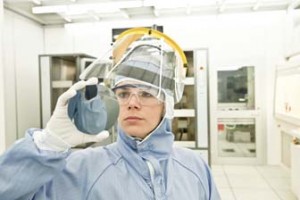 Semiconductor processors oversee the manufacturing of electronic semiconductors, which are commonly known as integrated circuits or microchips. These microchips are found in all electronic devices—including cell phones, cars, and laptops—and are an important part of modern life.
Semiconductor processors oversee the manufacturing of electronic semiconductors, which are commonly known as integrated circuits or microchips. These microchips are found in all electronic devices—including cell phones, cars, and laptops—and are an important part of modern life.
Duties
Semiconductor processors typically do the following:
- Look over work orders, instructions, and processing charts to determine a work schedule
- Monitor machines that slice silicon crystals into wafers for processing
- Use robots to clean and polish the silicon wafers
- Load wafers into the equipment that creates patterns and forms the electronic circuitry
- Set and adjust controls to regulate the manufacturing equipment’s power level, temperature, and other process parameters
- Adjust the process equipment and repair as needed during the manufacturing process
- Test completed microchips to ensure they work properly
- Review the manufacturing process and suggest improvements
Semiconductor processors, also known as process technicians, are largely responsible for quality control in the manufacturing process. They check equipment regularly for problems and test completed chips to make sure they work properly. If a problem with a chip does arise, they determine if it is due to contamination of that particular wafer or if it was caused by a flaw in the manufacturing process.
Job Outlook
Employment of semiconductor processors is projected to decline 27 percent from 2012 to 2022. Although there is a strong demand for semiconductors in many products, automation at fabricating plants is expected to grow, meaning that plants will need fewer workers. Because during the manufacturing process semiconductors are highly sensitive to impurities, it is more effective to use robots to do many of the simple tasks that processors once did. In addition, the increasing complexity of chips, combined with their reduced size, makes it difficult for people to work on them.
The semiconductor manufacturing industry, where most processors work, is also expected to decline, leading to more job losses. Operating a plant in the United States is more expensive than operating one in another country where manufacturing costs are often lower. This leads to companies sending the manufacturing of chips abroad, even though designing the chips will continue to take place in the United States.
Job Prospects
Competition for semiconductor processor jobs is expected to be tough because of the projected decline in employment. Prospects should be best for those who have a bachelor’s degree or experience in other high-tech manufacturing jobs. Employment opportunities are not available in all states because semiconductor plants are expensive to construct, due to the high-tech manufacturing process that semiconductors must undergo. Employment opportunities for semiconductor processors are therefore concentrated in states where there are existing semiconductor plants.
How to Become a Semiconductor Processor
Many employers prefer that semiconductor processors have an associate’s  degree in a field such as microelectronics.
degree in a field such as microelectronics.
Education
Many semiconductor processors have an associate’s degree in a field such as microelectronics. These programs are usually offered at community colleges. Students should take science and engineering courses, such as chemistry, physics, and classes in electronic circuits.
There is an emerging trend of employers preferring semiconductor processors to have a bachelor’s degree in engineering or a physical science because of the increasing complexity of the manufacturing plants.
Training
New semiconductor processors need on-the-job training from 1 month to 1 year. During this training, a processor learns how to operate equipment and test new chips. Manufacturing microchips is a complex process, and it takes months of supervised work to become fully proficient.
Workers with more education may have learned some techniques in school and need less on-the-job training. Because the technology used in manufacturing microchips is always evolving, processors must continue to be trained on new techniques and methods throughout their careers.
Important Qualities
Communication skills. Semiconductor processors must clearly communicate their recommendations on how to improve the manufacturing process to engineers and other workers.
Computer skills. Much of the equipment that these workers use is programmable—that is, a computer language determines how the equipment operates. Semiconductor processors must modify the specifications in programs to adjust for a change in the manufacturing process, such as a change in robot sensing requirements.
Critical-thinking skills. Semiconductor processors use logic and reasoning to uncover problems and determine solutions during the manufacturing process.
Detail oriented. Because a minor error or impurity can ruin a chip, processors must be able to spot tiny imperfections.
Dexterity. Semiconductor processors must be able to use tools and operate equipment to make precise cuts and measurements.
Science skills. Processors must understand the chemical composition and properties of certain substances that they may use in manufacturing semiconductors. They need to know a lot about electronics and about the manufacturing process, which involves the application of ideas from chemistry and physics.
Opportunities in Semiconductor Companies
Applied Materials
http://www.appliedmaterials.com
At Applied Materials, its vision is to apply nanomanufacturing technology to improve the way people live. It is the company behind the scenes of some of the industries that have helped changed the world as we know it with technologies that enable the semiconductor, display and solar industries.
Applied Materials is built on the strength of talented people. It offers a wide variety of job opportunities that will develop your skills while broadening your experience and engaging you in a dynamic, fast-changing industry.
At Applied Materials, you will work in community to achieve a common goal and encounter exciting new challenges every day. Applied Materials is continually evolving: implementing innovations to make semiconductors more portable, powerful, and affordable than ever before.
- Engineering
- Science
Hitachi Asia Ltd.
For more than a century, Hitachi’s technologies have contributed to the betterment of society – bringing greater convenience, comfort and sustainability. Hitachi has been the foundation of change, the catalyst of tomorrow and the bridge to our future.
Hitachi’s Global Talent Management Programme opens your horizon to umpteen growth opportunities through its personalised assessments, mentoring programme, networking sessions with its executives, industrial and immersion attachments to its diverse business groups in Japan and Asia, as well as sponsorship for programmes to enhance your professional and personal growth.
Hitachi emphasizes continuous enrichment of its high potentials through its rigorous leadership development and succession planning programmes where individuals’ aspiration will soar to a greater height through leading strategic, cross-border, cross-functional projects and assignments!
- Engineering (excluding Aerospace Engineering or Aerospace Systems / Bioengineering / Chemical /Information Engineering and Media / Marine / Offshore / Maritime Studies / Naval Architecture / Renaissance Engineering Programme)
- Logistic & Operation Management
- Project & Facilities Management
Infineon Technologies
Infineon Technologies provides innovative semiconductor and system solutions that address three central needs of modern society, namely energy efficiency, mobility and security. Infineon’s success with customers stems from its strategic focus on innovation, its leading position in the global market, and its high performance as an organisation of some 26,000 employees worldwide.
At Infineon, its people are assured of excellent career opportunities as the organisation offers the full value chain from R&D to manufacturing. The company has in place a development framework consisting of different learning roadmaps, and Infineon offers both managerial and technical career paths to maximise the potential of its people so that they can contribute at their best. Scholars have the opportunity to gain useful work experience while studying, through Infineon’s comprehensive internship programme covering real business projects, formal orientation, in-house training, dialogues with the management and more.
Improving Life – improving energy efficiency, mobility and security
Infineon Technologies focuses on these three challenges of a modern society
Energy Efficiency: Improving efficiency in the generation, distribution and consumption of electricity, reducing carbon footprint and energy wastage
Mobility: Making cars clean, safe and smart by reducing emissions, introducing advanced driver assistance system, and innovative electric and hybrid solutions
Security: Enhancing security of connected devices enabling trust and convenience in electronic and mobile payment, data protection in electronic document.
- Business
- Computer Science
- Engineering (Computer / Electrical / Electronic / Engineering Product Development / Engineering Systems and Design / Industrial and Systems / Information Systems Technology and Design / Mechanical / Mechanical Design & Manufacturing / Mechatronics)
- Logistics (Logistic & Operation Management / Supply Chain Management)
Micron
Micron is one of the world’s leading providers of advanced semiconductor solutions. Its worldwide operations manufacture and market a full range of memory technologies, packaging solutions and semiconductor systems for use in computing, consumer, networking and mobile products.
During their internships and subsequent career development within the company, scholars will learn about data and metrics-driven decision making, accountability to customers and the critical need to innovate and be efficient in the industry. They will be given rigorous training on fabrication tools and personal development skills while taking on challenging assignments both locally and abroad. Micron provides a dynamic environment and opportunities for collaboration across borders.






